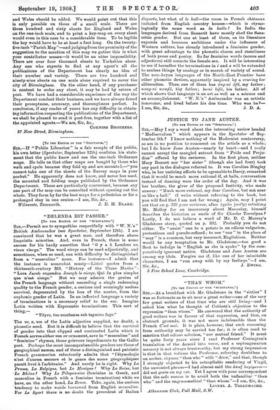"DELENDA EST PASSER."
[To THE EDITOR OF TILE "SPECIFATOIL.] Sin,—Permit me to sympathise respectfully with " W. N.'s " British Ambassador (see Spectator, September 12th). I am convinced that he was a great man, and therefore above linguistic minutiae. And, even in French, there is some excuse for his hardy assertion that "il y a h Londres nn vieux vierge." The word vierge can be used adjectivally, and sometimes, when so used, can with difficulty be distinguished from a " masculine " noun. For instance—I admit that the instance is somewhat musty—Littre quotes from a thirteenth-century MS. "History of the Three Maiies" : P° Lora Jacob engendra- Joseph is vierge, Qui fu plus simples que n'eat sierge." But we may admire the genius of the French language without conceding a single redeeming quality to the French gender, a curious and seemingly useless survival, degenerated by the loss of the neuter, from the euphonic gender of Latin. In an inflected language a variety of terminations is a necessary relief to the ear. Imagine Latin written with Esperantic terminations. This sort of
thing,— "Tityro, tug reenbansa sub tegmino (ago."
The us, a, um of the Latin adjective supplied, no doubt, a phonetic need. But it is difficult to believe that the survival of gender into that clipped and contracted Latin which is 'French serves either use or ornament, save in " masculine" and ," feminine " rhymes, those grievous impediments to the Gallic poet. Perhaps the most incomprehensible genders are those of geographical names, and of these a distinguished and patriotic French grammarian reluctantly admits that " l'etyrnologie n'est d'aucun 1u:scours et he genre des noms geographiques paralt Byre ii l'arbitraire." And surely he is right. Why La Prusse, La Belgique, but Le Mexique ? Why La Seine, but 'Le Milne ? Why Le Peloponnese (feminine in Greek, and masculine in French with a feminine termination) while we have, on the other hand, La Beau. Take, again, the curious ' tendency to make words borrowed from English masculine. For Le Sport there is no doubt the precedent of Italian disporto, but what of le hall—the room in French chiteaux imitated from English country houses—which is etymo- logically the same word as la halls ? In India the languages derived from Sanscrit have mostly shed the Sans- critic gender. But one at least of them, as its literature expands and becomes ambitious under the influence of Western culture, has already introduced a feminine gender, with great advantage to the phonetic charm and stateliness of both prose and poetry. So far feminine words (nouns and adjectives) still connote the female sex. It will be interesting to see if hereafter the terminations in i and a will be extended to sexless things by analogy or in search of variety of sound. The non-Aryan languages of the North-East Frontier have other phonetic devices, apparently inspired by a craving for alliteration. Thus, one of them has dng-ni dfd, my father ; nang-ni namfd., thy father; be-ni bifd, his father. All of which shows that language is an art as well as a science and an accomplishment. "W. N.'s " Ambassador was an artistic innovator, and lived before his due time. Who was he P-










































 Previous page
Previous page